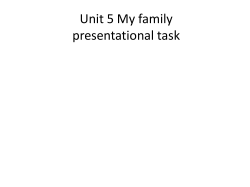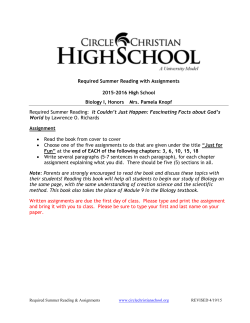
Learn more about proposed changes to grading practices
Grading Practices Grading Scale for: All Core content areas: Language Arts, Mathematics, Science Social Studies, Resource Elementary/K-1 Four Point Scale: 100 Point Scale: Elementary/2-5 4: Student’s performance exceeds standard/expectation and student consistently produces outstanding work. A = 90-100 Excellent B = 80-89 Very Good The new scale incorporating the 4, 3, 2, 1 rating will be effective at the beginning of the 2015-16 school year. 3: Student’s performance meets standard/expectation and student consistently produces quality work. C = 70-79 Satisfactory D = 60-69 Marginal Progress The 10 point grading scale is effective as of the 2014-2015 school year. 2: Student’s performance is approaching standard/expectation and student inconsistently applies learned skills. Please note that the new grade scale is not retroactive; historical grades will not be recalculated. Standards Based Reporting and Scores: • Core Subjects • Visual Arts • Music • Physical Education • World Language 1: Student’s performance is below standard/expectation and student frequently requires re-teaching. All report cards K-5 will have a numeric scale from 1-4 indicating student progress on standards. Sub-skills will be noted under each subject with the numeric scale used to indicate level of student mastery. Number Score 4 3 2 1 Revision Date: 4/21/2015 F = below 60 Failing Descriptor Student’s performance exceeds standard/expectation and student consistently produces outstanding work. Student’s performance meets standard/expectation and student consistently produces quality work. Student’s performance is approaching standard/expectation and student inconsistently applies learned skills. Student’s performance is below standard/expectation and student frequently requires re-teaching. Page 1 Grading Practices Late Work Homework Zeros Reading Work Related Skills Assessed Attendance Reported Academic Dishonesty Revision Date: 4/21/2015 • Work not completed by a deadline is late work. Late work will result in a reduced grade for a student. RECOMMENDATION: Homework must be linked to high-quality classroom instruction and be meaningful with an emphasis on quality and not quantity. Homework forms an essential component of the learning process for students. Assignments designated as homework should accomplish one or more of the following: • Prepare for in-class assignments or long-range projects • Provide practice on concepts or skills already taught • Enrich, enhance, and extend the classroom experience • Provide real-life applications • Provide time for research, reflection, and/or creation Homework should be accounted for but will not be given a letter grade or be used in calculating content grades. Teachers are to use the Work-Related Skills area of the report card to note a concern or need for improvement. Students are also encouraged to read 20 minutes per day at home. • • Zeros (no credit) will be given for work not attempted or submitted. Teams of teachers along with the principal will discuss the impact of zeros, and, where patterns of zeros are present, determine actions to help increase student submission of completed assignments to minimize the number of zeros. Reading on/above/below grade level will be noted in the elementary report card 21st Century Skills will be assessed on four-point scale for the following areas: • Critical Thinking/Responsibility/Collaboration/Communication/Self-Management/Technology Literacy • Assessment of 21st Century skills will begin during the second year of report card implementation after schools receive project based learning training • Days Absent/Days Tardy/Early Dismissal • Teachers have a responsibility to review the correct use of sources, structure the testing environment to reduce the possibility of cheating, and specify the types of collaboration that are permissible. • Students have a responsibility to avoid situations that might contribute to plagiarizing or cheating and to adhere to the guidelines provided by the teacher for each assessment. • Specific information about Honor Policy expectations is provided at each school. • Plagiarizing is the use of another person’s distinctive ideas, images, or words without acknowledgement or authorization. Plagiarizing will result in a reduced grade or zero. • Cheating is academic deception. It involves knowingly providing or receiving unauthorized assistance. Cheating will result in a zero. Page 2 Grading Practices Secondary Grading Scale The new scale will be effective at the beginning of the 2014-15 school year. Please note that the new grade scale is not retroactive; historical grades will not be recalculated. Late Work Homework • Letter Grade Point Range Descriptor GPA A+ A B+ B C+ C D+ D F 97-100 90-96 86-89 80-85 76-79 70-75 66-69 60-65 Below 60 Excellent 4.5 4.0 3.5 3.0 2.5 2.0 1.5 1.0 0.0 Very Good Satisfactory Minimum Passing Failing GPA for Honors/Dual Enrollment 5.0 4.5 4.0 3.5 3.0 2.5 2.0 1.5 0.0 GPA for AP/IB/Industry Certification 5.5 5.0 4.5 4.0 3.5 3.0 2.5 2.0 0.0 Work not completed by a deadline is late work. Late work will result in a reduced grade for a student. RECOMMENDATION: Homework must be linked to high-quality classroom instruction and be meaningful with an emphasis on quality and not quantity. Homework forms an essential component of the learning process for students. Assignments designated as homework should accomplish one or more of the following: • Prepare for in-class assignments or long-range projects • Provide practice on concepts or skills already taught • Enrich, enhance, and extend the classroom experience • Provide real-life applications • Provide time for research, reflection, and/or creation In Grade 6 and beyond, homework should play an important role for academic success as measured by grades and/or standardized test scores. Homework can be formative or summative. Students are encouraged to read 20 minutes per day at home. Revision Date: 4/21/2015 Page 3 Grading Practices Zeros Work Related Skills Assessed Attendance Reported Academic Dishonesty Revision Date: 4/21/2015 • • Zeros (no credit) will be given for work not attempted or submitted. Teams of teachers along with the principal will discuss the impact of zeros, and, where patterns of zeros are present, determine actions to help increase student submission of completed assignments to minimize the number of zeros. Drop-down menu of comments related to: • Academic Effort • 21st Century Skills (Assessment of 21st Century skills will begin during the second year of report card implementation after schools receive project based learning training) • Days Absent • Days Tardy • Teachers have a responsibility to review the correct use of sources, structure the testing environment to reduce the possibility of cheating, and specify the types of collaboration that are permissible. • Students have a responsibility to avoid situations that might contribute to plagiarizing or cheating and to adhere to the guidelines provided by the teacher for each assessment. • Specific information about Honor Policy expectations is provided at each school. • Plagiarizing is the use of another person’s distinctive ideas, images, or words without acknowledgement or authorization. Plagiarizing will result in a reduced grade or zero. • Cheating is academic deception. It involves knowingly providing or receiving unauthorized assistance. Cheating will result in a zero. Page 4
© Copyright 2025










